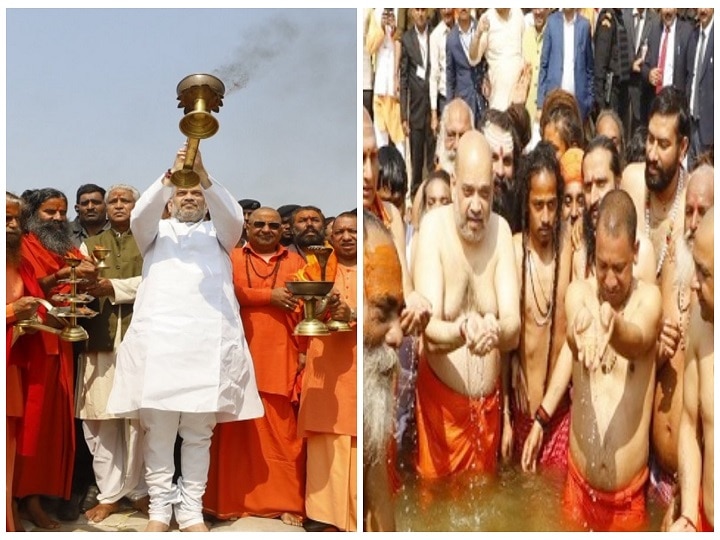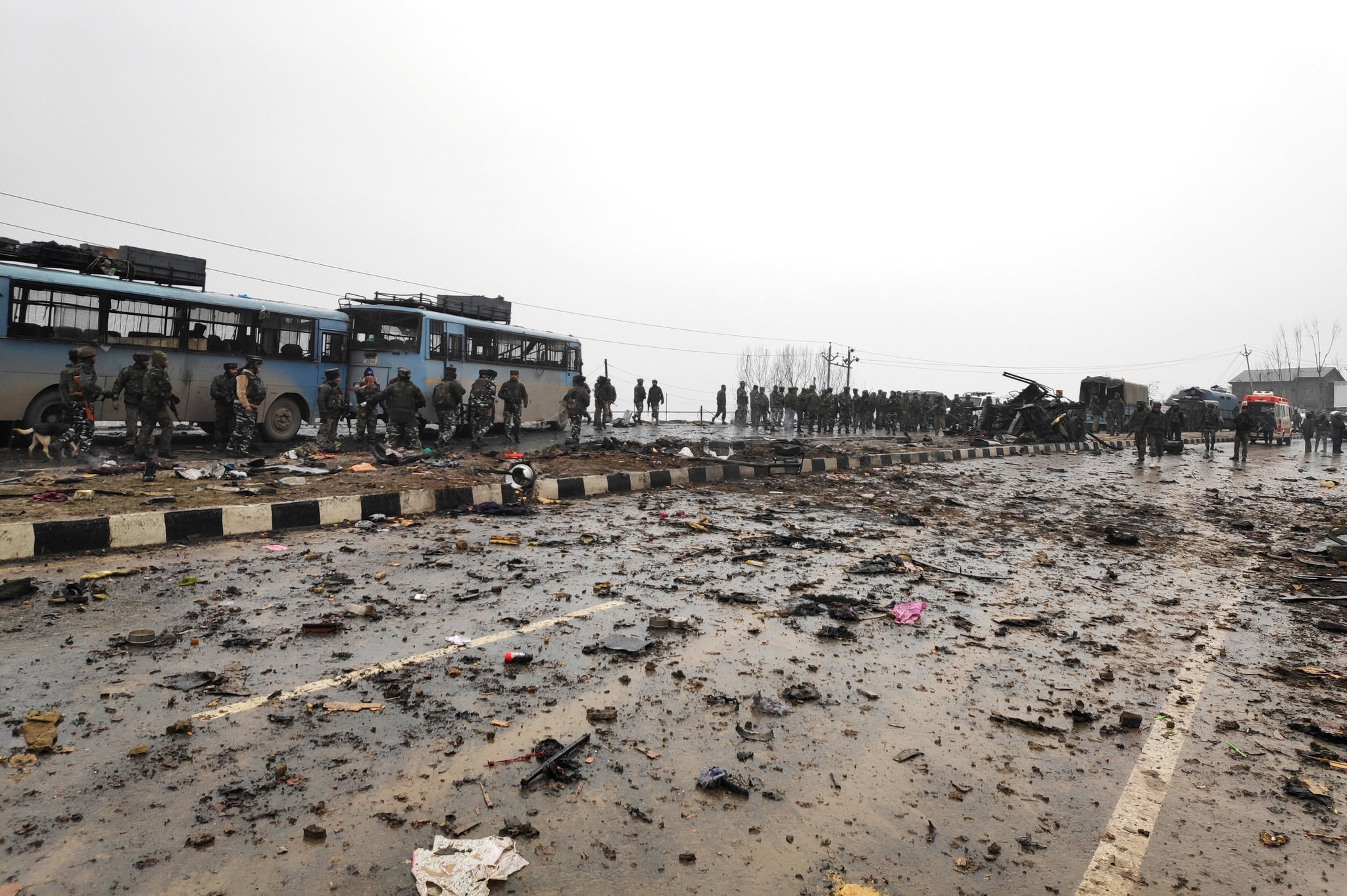


Amidst tight security, Union Home Minister Amit Shah joined thousands of devotees and prominent seers in taking a dip at the Triveni Sangam in Prayagraj during the ongoing Maha Kumbh. He also had an interaction with top seers before and after his dip, showcasing the importance of the event to the ruling party. Chief Minister Yogi Adityanath also took part in the ritual separately, enhancing the prominence of the event.
Union Home Minister Amit Shah Takes Holy Dip at Maha Kumbh
Amidst heightened security, Union Home Minister Amit Shah participated in the ongoing Maha Kumbh in Prayagraj, Uttar Pradesh. Accompanied by thousands of devotees and prominent religious leaders, Shah took a dip at the Triveni Sangam, the sacred confluence of the Ganges, Yamuna, and Saraswati rivers.
Significance for the Ruling Party
Shah's presence at the Maha Kumbh underscores the significance of the event to the ruling Bharatiya Janata Party (BJP). The BJP has consistently sought to align itself with Hindu religious traditions, and its leaders' participation in Kumbh Melas is seen as a way to consolidate their support among the majority Hindu population.
Chief Minister Yogi Adityanath's Participation
Chief Minister Yogi Adityanath also participated in the ritual, highlighting the state government's efforts to promote and facilitate the Kumbh Mela. Adityanath has made the development of religious tourism a key priority, and the Kumbh Mela is expected to attract millions of domestic and international visitors.
Background
The Maha Kumbh is one of the largest religious gatherings in the world, held every 12 years at different locations along the Ganges River. The present Kumbh Mela in Prayagraj began on January 15th and is expected to conclude on March 4th. This year's event has been particularly challenging due to the COVID-19 pandemic.
Top 5 FAQs and Answers
1. What is the significance of the Maha Kumbh?
The Maha Kumbh is a sacred festival that celebrates the mythology of the gods and goddesses of Hinduism. It is believed that bathing in the holy waters of the Triveni Sangam during the Kumbh Mela can cleanse sins and bring blessings.
2. How many people are expected to attend the Maha Kumbh?
Around 12 crore (120 million) people are expected to participate in this year's Maha Kumbh, making it one of the largest religious gatherings in history.
3. What are the major events of the Maha Kumbh?
The main events of the Maha Kumbh include the Shahi Snans, or royal baths, where millions of pilgrims bathe in the Triveni Sangam. Other events include religious ceremonies, cultural performances, and exhibitions.
4. What are the challenges associated with hosting the Maha Kumbh?
The Maha Kumbh poses significant logistical and security challenges. The vast number of pilgrims requires extensive planning and management, while the risk of stampedes and other crowd-related incidents necessitates heightened security measures.
5. What is the impact of the COVID-19 pandemic on the Maha Kumbh?
The COVID-19 pandemic has cast a shadow over the Maha Kumbh. Authorities have implemented strict safety protocols, including mandatory masks, social distancing, and mass vaccination drives. However, with millions of people expected to participate, concerns remain about the potential for large-scale outbreaks.

The Indian National Congress (INC) has announced its plans to launch a month-and-a-half-long campaign in Jammu and Kashmir on April 22. The purpose of the campaign is to demand the restoration of statehood and to further the “Save the Constitution” movement. With the recent appointment of Syed Naseer Hussain as the new J&K in-charge, the party hopes to regain its lost support in the Union Territory. This campaign comes at a crucial time, as former supporters of the Congress leader Ghulam Nabi Azad have recently dissolved their party, raising questions about their political future. The Congress hopes to use this opportunity to highlight the BJP's failures in empowering elected governments and its betrayal over statehood.

Thousands of citizens in Pune are rallying together through an online petition to demand the protection of their city's hills and hill slopes from any construction. The petition is addressed to the former Pune Municipal Commissioner and Chairman of the state-appointed Committee on Bio-Diversity Park and Hill Top Hill Slopes. The citizens are concerned that the committee's review may result in allowing construction on the hills, while strict measures have already been mandated by the government to prevent it. The citizens stress the importance of preserving these natural areas for the city's ecological balance and urge the government to uphold its promise to future generations.

After the devastating terror attack in Pahalgam, Jammu and Kashmir, India has suspended the 1960 Indus Waters Treaty with Pakistan. This decision was made during a key meeting chaired by Union Home Minister Amit Shah, with discussions on potential actions being taken against Pakistan. As tensions between the two countries continue to escalate, Indian leaders have condemned Pakistan for their involvement in the attack and have vowed to take strong measures in response.

The Indian Army made its first major move since the Pahalgam terror attack on April 22, as they killed top Lashkar-e-Taiba (LeT) commander Altaf Lalli in an encounter in Jammu and Kashmir's Bandipora district. The security forces are on the hunt for the terrorists responsible for the brutal killing of 26 civilians and have launched a massive anti-terror operation. In other developments, Indian Army Chief General Upendra Dwivedi visited Srinagar for a security review meeting and the authorities demolished the houses of two suspected terrorists involved in the Pahalgam attack.

In a hearing at the Supreme Court, the bench rebuked Congress leader Rahul Gandhi for his "irresponsible" comments about freedom fighter Vinayak Damodar Savarkar. The judges highlighted the need to show respect for India's freedom fighters and questioned whether Gandhi was aware of his grandmother and Mahatma Gandhi praising Savarkar. The court also stayed an Allahabad High Court order that refused to dismiss a lower court's summons against Gandhi over his alleged remarks about Savarkar.

The Supreme Court has stepped in to warn Congress MP Rahul Gandhi over his comments about India's independence activist Veer Savarkar, staying a trial court's summons to the politician. The top court emphasized that Savarkar is a highly respected figure in Maharashtra and stated that no one would be allowed to make derogatory remarks about freedom fighters. The court also pointed out that Gandhi's family has had a history of praising Savarkar and Gandhi himself has been warned that the court will take suo motu cognizance of any such remarks. Additionally, the article also mentions an attack in Jammu and Kashmir that has led to heightened tensions between India and Pakistan.

In a successful operation by the security forces, a Lashkar-e-Taliba (LeT) terrorist associate, identified as Altaf Lalli, was killed in an ongoing encounter in the Bandipora district of Jammu and Kashmir. The encounter began after the security forces received intelligence about the presence of terrorists in the area. Two security personnel have also been injured in the exchange of fire and are currently undergoing treatment at a nearby hospital. The clash highlights the continued efforts of the security forces to combat terrorism in the region.

The Telangana-Chhattisgarh border is a hotbed of tension as security forces step up their efforts to root out Maoist activity from the region. Top Maoist leader Hidma is the target of current high-security operations, with forces strategically advancing through previously inaccessible areas. With mounting pressure, sources indicate that the hold of the Maoists in the region is gradually weakening, making for a tense and critical situation.

As the nation grapples with the aftermath of a terror attack in Pahalgam, security forces are undertaking a massive operation in the dense Karregutta hills forest to eliminate the heart of Naxal command. This operation, involving 7,000 personnel and cutting-edge technology, aims to strike a blow at Naxalism by targeting top leaders of the PLGA Battalion No. 1. This bold move by the CRPF, with the Director General personally overseeing the operation, marks a turning point in the fight against Maoist insurgency. With five Naxals already killed and more likely to come, the operation is being hailed as a decisive victory and could potentially spell the end of Naxalism in India.

The US Government has publicly criticized The New York Times for its reporting on the recent terror attack in Pahalgam, Kashmir, calling attention to the difference between the newspaper's use of "militant" instead of "terrorist." This choice of words is not only misleading but also minimizes the severity of the attack, which was claimed by a Pakistan-based group with links to Lashkar-e-Taiba. The US House Foreign Affairs Committee took to social media to point out the error and highlight the real nature of the attack, noting that it has significant implications for regional security.